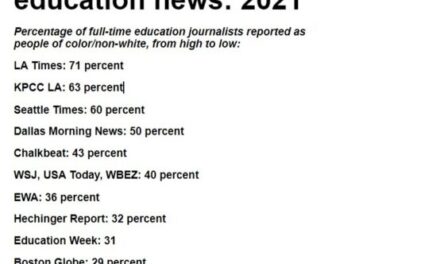In this week’s newsletter: Snow and ice closed schools across the country — but at least one superintendent regrets his decision. A new report highlights teacher training as a glaring oversight in literacy reform efforts — which often leave out English learners, too. And New York City teenagers mock the media reaction to a short-term shutdown of their high school.
SNOW DAY REGRETS
The big story of the week
The big education story of the week is the weather-related school closures and virtual days across the country — from Portland, Oregon, to Atlanta, Georgia (OPB, Oregonian, KOIN, Atlanta Journal-Constitution, Atlanta News First, PBS, Colorado Public Radio, NBC Chicago).
There’s lots of variation from district to district in how superintendents make the call and whether they opt for virtual learning (Bridge Michigan, Oregonian, Oregon Public Broadcasting). Perhaps the biggest surprise was the number of schools closed across the South, where 1 million children were affected (New York Times).
In Houston, below-freezing temperatures and icy roads led to school closures Tuesday, with a few schools letting kids out early Wednesday due to heater issues (Houston Public Media). But Houston Superintendent Mike Miles thought he should have kept schools open “despite the whining” (Houston Chronicle, Houston Public Media).
More bad weather is coming. How are closing decisions being made? What about vulnerable students? There’s lots of opportunity to add nuance and insight in the coverage.
Other big education stories this week:
📰 LITERACY REPORT: Despite a nationwide push for literacy instruction reform, a new report from the nonprofit National Center on Teacher Quality (NCTQ) shows that 19 states still lack strong policies to support the science of reading (K-12 Dive). And of the states with beefed-up policies, many don’t adequately prepare teachers to carry out those changes in instruction (The 74, Chalkbeat, EdSource). Still, there are some bright spots and praise for states like Minnesota, which is implementing new teacher training requirements on literacy (Star Tribune).
📰 WHITE HOUSE ABSENTEEISM PLAN: Better late than never, the Biden administration announced a new plan to improve student attendance (Chalkbeat, EdWeek, Axios). The plan calls for more high-dosage tutoring and expanded summer and after-school learning. New data shows that on a typical school day last fall, 90% of students across the country showed up (Washington Post). Experts say that number is too low as districts fight a persistent chronic absenteeism problem (PBS NewsHour).

ENGLISH LEARNER LITERACY
The best education journalism of the week
The best education story of the week is Colin Hogan’s The students the reading wars forgot in the New Bedford Light.
Tackling the literacy story from an under-reported angle, Hogan describes how a coastal city that’s home to many immigrant families is overhauling its reading instruction and teacher preparation with English learners in mind.
“As a debate rages about how to better teach reading in the U.S.,” Hogan writes, “little of it has focused on the students who most need help.”
Hogan’s story will teach you a lot about the social and instructional considerations that ought to go into a literacy program for English learners. It’ll also charm you with its classroom observations, which introduce several enthusiastic kids. His opening anecdote depicts a subtle exchange between a paraeducator and a kindergartner from El Salvador named Anderson. Hogan visited several multilingual classrooms in his reporting.
But far from being blindly optimistic, the story also points out where the city and state need to improve to better serve immigrant families. And it implicitly challenges education reporters everywhere to ask about English learners in their own school districts.
Other great education stories this week — and why we liked them:
👏 Naomi Martin details the daily travails, humiliations, and aspirations of a 17-year-old facing a lifetime of struggle because of his rudimentary reading skills (Boston Globe). Texts, homework, letters from school? He can’t read any of them.
👏 In a piece that intersects with education themes like absenteeism and student mental health, Ellie Rushing profiles all 23 Philadelphia children who died from gunfire last year (Philadelphia Inquirer). It’s thorough and respectful — a celebration of the kids’ short lives.
👏 In a story that weaves together cautionary tales from parents and opinion from expert psychologists, former NPR education reporter Anya Kamenetz explores the pros and cons of kids taking a “mental health day” off from school (The Cut/New York Magazine).
👏 Philadelphia’s roving “reading captains” connect kids with literacy resources in this character-rich Carly Sitrin piece about a 7-year-old program led by Black mothers and neighborhood elders who’ve stepped in where the school system is lacking (Chalkbeat Philadelphia).
A VETERAN REPORTER REFLECTS
Our latest columns and commentary
For this week’s column we spoke with former HuffPost education reporter Rebecca Klein, who reflects on her years as a reporter from her new perch as publisher of New York Focus, which is still accepting applications for its new education reporter opening.
In candid remarks, Klein describes how special education deserves more coverage, regrets that her stories didn’t often focus on everyday parents’ interests and needs, and laments the traditional left-right political framing in education coverage that she (and many others) produced.

Above, from left to right: EWA’s newest elected members of its board of directors are Daarel Burnette II (Chronicle of Higher Education), Wayne Carter (NBC 5 News Dallas-Fort Worth), Alia Wong (USA Today), and Nicolle Grayson (The Education Trust).
PEOPLE, JOBS
Who’s going where and doing what
🔥 Career moves: Houston Chronicle education reporter Anna Bauman is leaving after 3.5 years — during which she also launched a children and families beat — to be an investigative reporter at Open Vallejo in the Bay Area. Former Miami Herald education reporter Sommer Brugal started her new job at Axios Miami. And meet the new batch of EWA reporting fellows, including AL.com’s Trisha Powell Crain, The 74’s Jo Napolitano, and the Hechinger Report’s Christina Samuels. Congrats to all!
🔥 New ventures: The LA Times early childhood education team is partnering with a local moms group on Facebook in the hopes of engaging with parents who are navigating raising young kids. Together Jenny Gold and Kate Sequeira will answer questions on chat forums and offer “mom-recommended resources.” Sounds like an interesting collaboration. I wonder how it will impact the Times’ reporting?
🔥 Job openings: USA Today is hiring a national news editor, and it’s considered a plus if applicants have experience reporting on education. The New Orleans Times-Picayune is hiring an education reporter. Check previous editions of this newsletter for more jobs that may still be open.
🔥 Curious to learn how students at a NYC school felt about their school’s one-day closure becoming national news, The City’s Gwynne Hogan told us she found that “many students I talked to said they felt pride that the school had been a safe place for families seeking a better life, and highlighted the diverse student body many of whom are first and second generation immigrants themselves.” She and Chalkbeat’s Michael Elsen-Rooney included students’ thoughts in the story.

Above: Check out the key takeaways from the Globe’s four-part literacy and dyslexia series.
APPEARANCES, EVENTS, & NEW RESOURCES
What’s happening and new research
⏰ Podcasts, appearances, & segments: WBUR Here & Now featured three education episodes within a week on expiring pandemic funds that helped homeless students, a school counselor bringing free college classes to high school students, and how middle schoolers are doing. NPR’s Fresh Air featured the Washington Post’s Peter Jamison about the rise in homeschooling. The Daily from the New York Times dug into the “messy fight over the SAT.” In case you missed it, Emily Hanford announced last week that “Sold a Story” has two new episodes coming soon and a Spanish translation. And the PBS NewsHour ran a segment on chronic absenteeism and how school leaders are addressing it.
⏰ Books: Ben Herold’s book “Disillusioned” — an “exploration of how hope, history, and racial denial collide in the suburbs and their schools” — is out next week. We’ll have a review of the book by Anya Kamenetz. Laura Pappano, who wrote last year for The Grade about covering school extremism, published an excerpt of her book “School Moms: Parent Activism, Partisan Politics and the Battle for Public Education” in the Hechinger Report. KQED MindShift recently reviewed Bettina Love’s book “Punished for Dreaming: How School Reform Harms Black Children and How We Heal.”
⏰ Upcoming: Join EdSource reporter Diana Lambert on Jan. 30 for a virtual roundtable about why superintendents are quitting and what can be done to keep them. The same day, the Rennie Center for Education Research and Policy is hosting its annual summit on the state of education in Massachusetts in person.
⏰ Research: Newly released federal data shows that more than three-quarters of public and charter schools have prohibited nonacademic use of cellphones in schools (USA Today). The same report also found decreases in nonviolent crimes at school, decreases in illegal substance use, high rates of cyberbullying, and a drop in policing and mental health services in schools (Washington Post, The 74). A study published this week in the journal Pediatrics shows that anonymous tip lines to prevent school shootings and suicides work (CNN). A Gallup poll found that 68% of Americans think that the ban on race-conscious admissions is mostly good (Higher Ed Dive). Teachers hired without traditional licenses turned out to be just as good as those with traditional qualifications in states like Massachusetts and New Jersey, writes policy wonk/journalist Matthew Yglesias — a story that could and should be told by education reporters.
THE KICKER

“We did remote learning for one and a half years,” said a high school junior in this delightfully self-mocking Chalkbeat/The City story. “I don’t see why people are making such a big deal of one day.”
That’s all, folks. Thanks for reading!
Reply to this email to send us questions, comments or tips. Know someone else who should be reading Best of the Week? Send them this link to sign up.
Using Feedly or FlipBoard or any other kind of news reader? You can subscribe to The Grade’s “feed” by plugging in this web address: http://www.kappanonline.org/category/the-grade/feed/.
Read more about The Grade here. You can read all the back issues of The Grade’s newsletter, Best of the Week, here.
By Alexander Russo with additional writing from Colleen Connolly and Will Callan.
ABOUT THE AUTHOR

The Grade
Launched in 2015, The Grade is a journalist-run effort to encourage high-quality coverage of K-12 education issues.
















